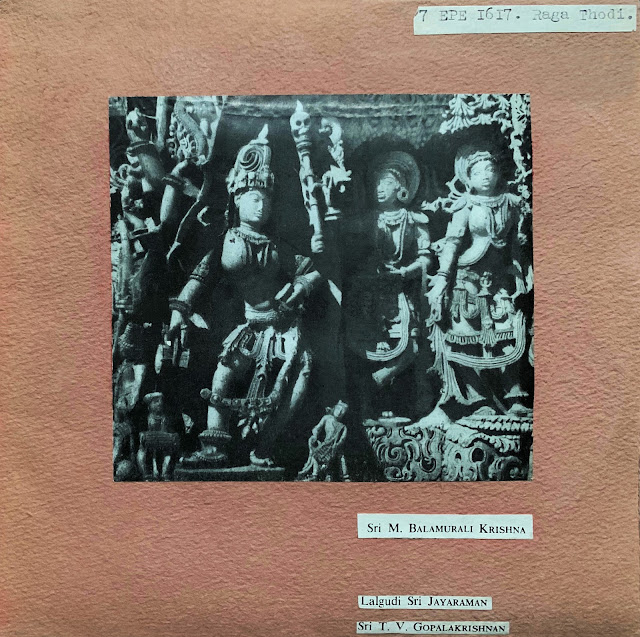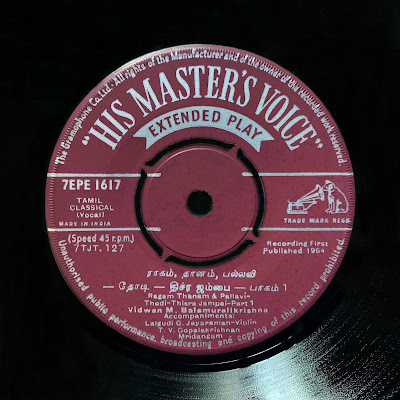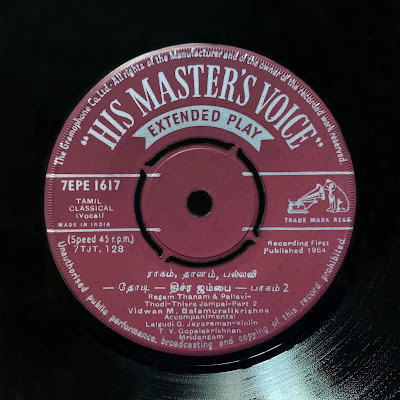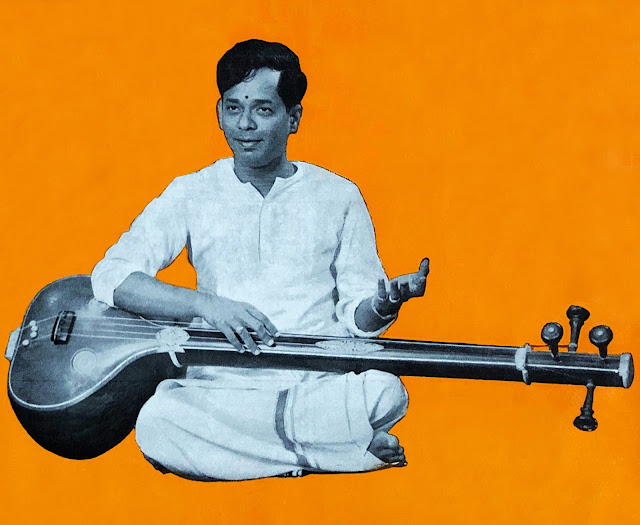INDIA – INDE
Balamuralikrishna with Lalgudi Jayaraman – Todi - Thisra Jampai – His Master's Voice – 7 EPE 1617, released 1964 (7 in, 45 RPM)
Born into a musical family in Sankaraguptam, Andhra Pradesh, M. Balamuralikrishna–aka Balamurali Krishna (1930-2016)–was one of the most celebrated Carnatic vocalist of the 20th century. His father, the famous flute player Mangalampalli Pattabhiramayya, entrusted the musical education of the young prodigy to Parupalli Ramakrishnaiya Pantulu (1883-1951), who had a direct lineage with the highly influential composer Tyagaraja (1767-1847).
Thanks to his colossal musical gifts, drive and energy, Balamuralikrishna had a rich and glittering 70-year-plus career in devotional and light classical Carnatic music, writing at least 400 compositions and performing more than 20,000 concerts in India and abroad. He also mastered the violin, veena, mridangam, and kanjira, appeared in films and performed jugalbandi duets with Hindustani artists, including Bhimsen Joshi (1922-2011), Kishori Amonkar (1932-2017), and Hariprasad Chaurasia (b. 1938).
Despite his virtuosity and great musical knowledge, the modernist trailblazer was often criticized for taking too many liberties with the Carnatic tradition. “He was truly an all rounder who could really do anything in music, all with a smile on his face. Very much like his music, he lived life to its fullest, never constricted by what society thought of him," says Carnatic music vocalist, T.M. Krishna.*
This album presents the maestro’s brilliant, heartfelt and free-flowing lyricism and his exquisite telepathic interactions with Lalgudi Jayaraman’s (1930-2013) incomparable violin and T.V. Gopalakrishnan’s (b. 1932) dynamic mridangam.
Né dans une famille de musiciens à Sankaraguptam dans l’Andhra Pradesh, M. Balamuralikrishna, ou Balamurali Krishna, (1930-2016) fut l'un des chanteurs Carnatic les plus célèbres du XXe siècle. Son père, le célèbre flûtiste Mangalampalli Pattabhiramayya, confia l'éducation musicale du jeune prodige à Parupalli Ramakrishnaiya Pantulu (1883-1951), héritier d’une lignée remontant directement au très influent chanteur et compositeur Tyagaraja (1767-1847).
Grâce à ses dons musicaux exceptionnels et sa grande énergie, Balamuralikrishna eut une carrière remarquable au sommet pendant plus de 7 décennies, avec notamment plus de 20 000 concerts en Inde et à travers le monde et 400 compositions à son actif. Il maîtrisait également le violon, la vînâ le mridangam et la kanjira, joua et chanta dans des films et se produisit en duos jugalbandi avec des artistes hindoustanis, tels Bhimsen Joshi (1922-2011), Kishori Amonkar (1932-2017) et Hariprasad Chaurasia (né en 1938).
Malgré sa grande virtuosité et ses vastes connaissances musicales, ce précurseur moderniste fut souvent critiqué pour n'être pas suffisamment fidèle à la tradition Carnatic. "C'était vraiment un musicien d’une grande polyvalence capable tout faire musicalement avec une facilité déconcertante, toujours avec le sourire aux lèvres. Il vivait pleinement sa musique et sa vie personnelle sans se soucier de l’opinion des autres », explique le chanteur Carnatic T.M. Krishna.*
Cet album présente le lyrisme brillant, fluide et sensuel du maestro et ses dialogues télépathiques lumineux avec le jeu du violon de l’incomparable Lalgudi Jayaraman (1930-2013) et le mridangam dynamique de T.V. Gopalakrishnan (né en 1932).
*https://www.livemint.com/Politics/yFeBi6cLIzom7aWJwks4aI/M-Balamuralikrishna-one-of-Carnatic-musics-most-respecte.html
Our other Carnatic vocal music posts:
M. D. Ramanathan – HMV 7 EPE 1646 here
M. S. Subbulakshmi – Meera Bhajans – EALP 1297 here
The Great Tradition (compilation) – Masters of Music – HMV EALP 1452 here
When my family lived in New Delhi in the mid-sixties, my father was fascinated by the Holy Men, or Sadhus, of Rishikesh, north of Delhi on the Ganges river at the foot of the Himalayas, of whom he made these photographs in 1964, the same year this recording was released:






this one is quite nice usually iprefer the non vocal pieces but this is very moving
ReplyDeleteroberth
Thank-you very much
ReplyDelete